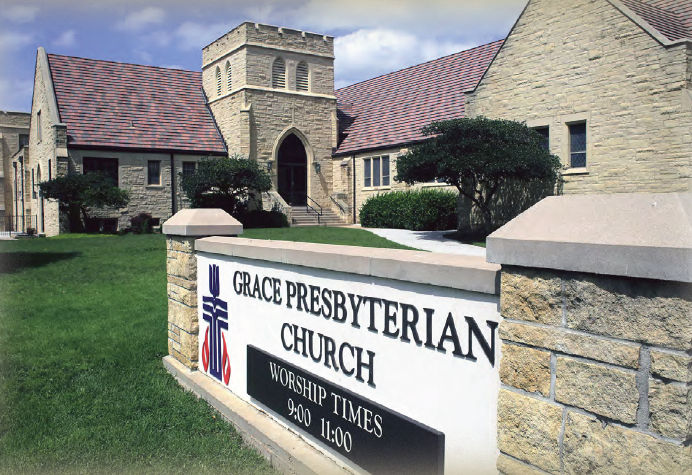Giving THAT Grows
PLANNED GIVING to Grace Presbyterian Church allows you to share the blessings you have received, by investing in the mission of our church and making a smart and generous financial decision.
A Letter from Our Session
Take a look around our church. At every turn you see the legacies of those here today and of those who came before us in the life of this church.
Those legacies helped build a new, safer playground used by children of our church, students at Jacob’s Learning Ladder Preschool, and families in our neighborhood. They provided the stained-glass windows in the sanctuary and in the Great Room.
They built the entire Great Room addition itself. They deliver the cool air that brings relief from our blazing Kansas summers.
These and countless other fixtures, features and programs were funded by members of Grace past and present – all contributions gladly made to ensure that their church survived and thrived not just in their time but in future generations.
Here we detail a way – through planned giving – that you or your family members can make lasting charitable contributions to Grace Presbyterian. Planned giving comes in many forms, from cash to securities to other assets, but shares a common attribute: It provides stability and strength to our church today, tomorrow and for many years to come.
Whether Grace benefits from your planned giving or not, we encourage you to have a written plan — by will, trust or other mechanism — to pass along the assets that you built over a lifetime. Having such a plan ensures that you — instead of the state and probate attorneys — control how those assets are passed down. We hope that Grace Church can be part of your plan and your legacy, because planned giving has a tremendous, lasting impact.
Your planned gift can build the endowment funds that help ensure unexpected expenditures don’t chip away at ministries we value. The endowment funds allow us the resources to financially sustain new Spirit-led ministries. You also can designate your planned gift go to something particularly meaningful to you at Grace. The gift can be made while you are alive and/or it can come after your death.
We read in Deuteronomy, “We all drink from wells we did not dig.” A planned gift is a way – a financially prudent and spiritually sound way – for you to help that tradition continue at Grace.
What is a Planned Gift?
The definition of a planned gift to Grace Presbyterian Church is straightforward: Any gift made, during the donor’s lifetimeor at death, that is part of the donor’s overall financial or estate planning.
What a planned gift can mean spiritually, though, is far more than that simple definition conveys. A planned gift is an opportunity to express the values you hold dear and can be an extension of your faith and practice. With such stewardship, you can choose the legacy you would like to leave at Grace.
Planned gifts can be made in a series of smaller installments or as one single gift. They can be as easy as changing a beneficiary designation or as complicated as a charitable remainder unitrust.
Many planned gifts use estate or tax planning techniques to maximize the gift and minimize its impact on the donor’s estate. In contrast, gifts and pledges to Grace’s operating and mission funds come from the donor’s discretionary income, and while they may be budgeted, they are not considered planned gifts.
Whether the planned gift involves cash, stocks, bonds, mutual funds, real estate, artwork, partnership interests, personal property, life insurance, a retirement plan or other assets, the benefits of funding a planned gift can make this type of charitable giving very attractive to both the donor and to Grace.
“God is able to provide you with every blessing in abundance, so that by always having enough of everything, you may share abundantly in every good work.” ~2 Corinthians 9:8
Advantages of a Planned Gift
TO YOU AND YOUR FAMILY
- Creation of a legacy that expresses your deepest convictions. It need not diminish current income or current assets.
- Potential income tax or estate advantages, or both, for you and your heirs.
- The satisfaction of knowing that you are contributing tothe future of Grace Presbyterian Church and its ministries for years to come.
TO GRACE CHURCH
- Endowment gifts serve as an enduring source of support for the growth of Grace’s ministries and the shepherding of its facilities.
- Growing endowments provide financial stability for the future of Grace.
- Each commitment to the future is a building block toward a stronger church family and community.
How Will My Gift Be Used?
You may allow future church leaders to determine how best to use your gift, or you may choose to direct the gift to support a ministry or ministries that are particularly meaningful to you. If no specific designation is made, one-half of the gift’s proceeds will be placed in the General Endowment Fund, one-quarter in the Facilities Fund and one-quarter inthe Mission & Ministries Fund.
To consider various options, please contact the Senior Pastor, Executive Pastor or a member of the Planned Giving Committee before finalizing your gift.
Endowment Funds at Grace Presbyterian
Planned gifts can go to one of Grace’s endowments:
THE GENERAL ENDOWMENT FUND: This fund’s principal is invested in perpetuity, with 5 percent of the fund’s valuedistributed each year. Half of the annual distributions go to the Capital Facilities Fund, and half to the Mission & Ministries Fund.
THE CAPITAL FACILITIES FUND: This fund’s principal and income are used for special projects and capital projects thatenhance the facilities and overall safety of the church building and improvements extending beyond the annual operating budget.
MISSION & MINISTRIES FUND: The principal and income from this fund are used for special programs, extended missions and extraordinary benevolence.
In addition, donors can create a Designated Endowment Fund for a specific program or purpose.
Examples of Planned Gifts to Grace Church
- Make a planned gift of cash or securities to Grace Presbyterian Church.
- Make Grace Church the beneficiary on an investment account. A beneficiary can be added to a bank account or certificate of deposit by using a “Payable on Death” agreement. For investment securities and real estate (including your personal residence), use a “Transfer on Death” agreement.
- State in your will that a specific dollar amount, a specific percentage of your estate orspecific assets be given to Grace Presbyterian Church at your passing. Remember that your will only covers those assets that do not have a beneficiary designation attached.
- Create a revocable living trust and state in the trust that you wish to have a specific dollar amount, a specific percentage of your estate or specific assets be given to Grace Presbyterian Church.
- Name Grace Presbyterian Church as a full or partial beneficiary of an IRA, annuity, life insurance or retirement account.
A visit with a planned giving specialist can give you other creative ideas to satisfy your needs.
Possible Tax Benefits of Planned Giving
- A donor could contribute appreciated property, such as securities or real estate, and receive a charitable deduction for the full market value of the asset while avoiding capital gains tax on the transfer.
- Donors who establish a life-income gift receive a tax deduction for the full, fair market value of the assets contributed, minus the present value of the income interest retained. If they fund their gift with appreciated property, they will generally avoid any upfront capital gains tax on the transfer.
- Gifts payable to charity upon the donor’s death, such as a bequest through a will or by beneficiary designation in a life insurance policy or retirement account, will generally avoid any estate or income taxation.
If you wish to arrange your giving to take advantage of current income tax benefits or to save on estate taxes, we would welcome the opportunity to provide a list of specialists familiar with planned giving.
Who Can Help Plan Your Gift?
Our Senior Pastor or Executive Pastor would be pleased to meet with you as you begin your deliberations concerning a planned gift to the church.
Members of Grace’s Planned Giving Committee also can visit with you and help you determine various planned giving options that might be appropriate for you. They can direct you to professionals who have experience with the various financial, tax and estate planning considerations of any gift that you wish to make. In all circumstances, however, you should consult with your own legal, tax and/or financial adviser as you begin to finalize your giving plans.
To get started on the planned giving process, please call the Grace Presbyterian Church office at 316.684.5215.
Reaping What Others Have Sown
Examples of what Planned Giving assets have provided for Grace Presbyterian Church in the past …
- Missions in our community and around the world.
- Seeding new ministries.
- Repairing the parking lot.
- Helping build the playground for church children and students at Jacob’s Learning Ladder Preschool.
- Purchasing new air-conditioning units.
Spending $16,000 on air-conditioning units may seem mundane, but the use of funds from our active and growing endowments allow Grace to focus the church’s resources on its Spirit-led, core mission: Ministries and programs that proclaim the word of Jesus and help people live Godly lives and build community.
We are rooted and grounded in love. Ephesians 3:17
Tips to Make Planned Giving Easier
- Planned giving is an area where a little help can make a big difference. All you need to start the process isa desire to create a lasting legacy. Then visit with one of the pastors, a Planned Giving Committee member or your professional advisers to discuss options that might be appropriate for you.
- Be certain that you identify Grace Presbyterian Church completely and correctly in any legal documents. Forinstance, to identify the church on a beneficiary designation consider using the wording: “The beneficiary is: 100% to Grace Presbyterian Church of 5002 E. Douglas in Wichita, Kansas.”
- Don’t overlook listing Grace Presbyterian Church as a contingent beneficiary. Estate assets pass to contingentbeneficiaries only if no primary beneficiary is living.
- Beneficiaries can receive a percentage of the total. For instance, 70 percent to my lawful living children, equally or the survivor and 30 percent to Grace Presbyterian Church of 5002 E. Douglas in Wichita, Kansas.
- Giving the “right” asset can stretch the benefit by leaving more to the church and your heirs.
Be aware that the declaration of beneficiaries in a will can be superseded when you specifically name a beneficiary of an asset. For example, if you name Grace Presbyterian Church as a beneficiary in your will but declare another person or organization as the beneficiary of certain stock holding, then that stock goes to the person or organization and is not governed by the will.
“It is the smallest of all the seeds, but when it has grown it is the greatest of all shrubs and becomes a tree, so that the birds of the air come and make nests in its branches.” ~Matthew 13

